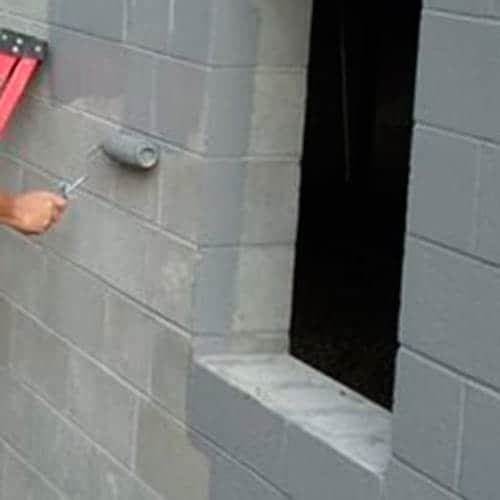Cementitious liquid waterproofing systems come in different forms, the most common is liquid combine with coating mix such as combination of cement, waterproofing agent, and a bonding material. These chemical additives penetrate concrete wall or floor to form crystalline structures within the substrate to prevent transmission of water seeping through the substrate. The coating cures to form a watertight membrane such as a waterproofing membrane
Cementitious liquid waterproofing is inflexible, it does not give any stretch ability for hot and humidity climate in Singapore, result in cracking especially around the joint. In more advance technology, polymer with rubber-like elastic is add into waterproof concrete, wall, and floor to prevent cracking.
Quality of the materials, method of application, number of coatings applied, and condition and preparation of the substrate are factors to determine how long a cementitious waterproofing membrane to last.
Cementitious liquid waterproofing is commonly use on toilet, kitchen, balcony, swimming pool, water tank and most wet areas. You may also read up similar article which we have mentioned on cementitious waterproofing.
For higher performance, liquid and polyurethane waterproofing membrane is highly recommended. They are super flexible than above cementitious liquid membrane.
Liquid coatings have the advantages of quick application, cost effective, and excellent elongation. One of the chief disadvantages is the possible inconsistency in coverage. It required skills and careful applicator to be sure of achieving that minimum coverage.
Liquid membranes can be applied by spray, roller, or trowel. The liquid cures into a rubbery coating on the wall. Some manufacturer has a spray-applied liquid membrane composed of polymer-modified asphalt.
Polyurethane liquid membranes in separate grades for trowel, roller, or spray are also available from various manufacturers. Due to their low hazards’ characteristics, excellent UV stability and ease of application, acrylic emulsions and polyurethane modified dispersions are becoming popular, particularly in warm and moderate climate regions.
Polyurethane (PU) based liquid applied membranes has risen in the last decade. The fast and efficient, rain resistance, stretchable and flexible application for unstable weather like Singapore, time saving, cost saving. The process is fast, the membrane cures at once after application. It has excellent bonding property that will bond onto cement, sand, and bitumen surfaces. Therefore, it can coat over existing waterproofing membrane layer. This membrane is chemical resistance to mild acid and resilient. Most suitable for large surface application such as balcony, roof top, pathway, and industrial application allowing heavy traffic pedestrian movement. They are environmentally friendly, it does not pollute, flame resistance and safe. It is very versatile material that can use on other waterproofing applications.
Polyurethane liquid membrane offers a wide variety of benefits. It can help resist water and it will not cause any joints or leak risk areas. The material is water vapor permeable too. It will provide adhesion for the full surface. Another thing to note is that polyurethane is great because it can resist oils, detergents, and other chemicals. It is excellent in this specific category. It provides a durable watertight seal that will last for years and ensures that it is going to keep your home protected for a long duration.
SWC Construction, offer the best waterproofing membrane and solution to homeowner and commercial requirement. Contact Us now for more information, we provide free consultation to enable you to understand more about waterproofing.



